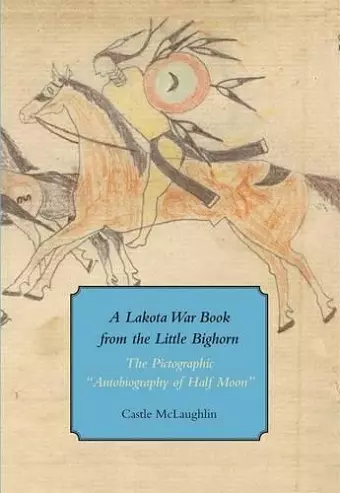A Lakota War Book from the Little Bighorn
The Pictographic "Autobiography of Half Moon"
Format:Paperback
Publisher:Houghton Library of the Harvard College Library
Published:6th Feb '13
Currently unavailable, and unfortunately no date known when it will be back

Houghton Library and Harvard’s Peabody Museum Press collaborated on the publication of this fourth volume in the Houghton Library Studies series, an innovative cultural analysis of the extraordinary composite document known as “The Pictographic Autobiography of Half Moon, an Unkpapa Sioux Chief.” At its core is a nineteenth-century ledger book of drawings by Lakota Sioux warriors found in 1876 in a funerary tipi on the Little Bighorn battlefield after Custer’s defeat. Journalist Phocion Howard later added an illustrated introduction and had it bound into the beautiful manuscript that is reproduced in complete color facsimile here.
Howard attributed all seventy-seven Native drawings to a “chief” named Half Moon, but anthropologist Castle McLaughlin demonstrates that these dramatic scenes, mostly of war exploits, were drawn by at least six different warrior-artists. Their vivid first-person depictions make up a rare Native American record of historic events that likely occurred between 1866 and 1868 during Red Cloud’s War along the Bozeman Trail.
McLaughlin probes the complex life history of this unique artifact of cross-cultural engagement, uncovering its origins, ownership, and cultural and historic significance, and compares it with other early ledger books. Examining how allied Lakota and Cheyenne warriors valued these graphic records of warfare as both objects and images, she introduces the concept of “war books”—documents that were captured and altered by Native warrior-artists to appropriate the strategic power of Euroamerican literacy.
The Little Bighorn wins a place in McLaughlin’s title by accident, because the drawings were found near the battlefield in a funerary lodge a few days after the fight. The details of the discovery are interesting enough, but it is the drawings themselves—what they represent and who made them—that give us a rich and startling view of life on the Northern Plains in the last years before the Indians who thought they owned them were confined to reservations… What’s interesting about McLaughlin’s book, in the way that only an exhaustive inquiry can be truly interesting, is the quantity of fundamental information she manages to wring from these drawings—when they were made, who made them, and what they depicted. McLaughlin makes no broad claims for what she is up to, but A Lakota War Book ought to be in the collection of any serious student of the Northern Plains or the Little Bighorn. -- Thomas Powers * New York Review of Books *
What sets these drawings apart from others of their kind is the persuasive argument made by McLaughlin that most of the drawings, and the book as a whole, represent an Indian account of episodes during the conflict known as ‘Red Cloud’s War’ (1866–1868), and that it may be possible to identify three of the artists…What is perhaps most remarkable is the intensely personal style of each artist, and the attention to identifying detail of weapons, clothing and body paint, thereby allowing the viewer a glimpse of the war from the other side. -- Thomas Powers * New York Review of Books blog *
McLaughlin’s brilliant contribution to the history, material culture, and art of the Plains provides a transformative understanding of Plains Indian ledger art. -- Candace Greene, Smithsonian Institution
ISBN: 9780981885865
Dimensions: unknown
Weight: unknown
368 pages